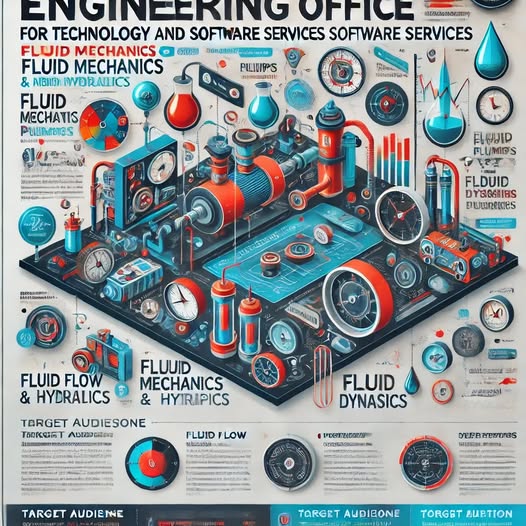
Engineering Office for Technology and Software Services Academy
This course delivers a comprehensive foundation in fluid mechanics and hydraulics, focusing on analyzing fluid flow, pressure losses, and pump system design. It’s tailored for engineers and students involved in designing hydraulic and fluid-based systems.
Mechanical Engineers
Civil Engineers
Hydraulic System Designers
Engineering Students (Mechanical, Civil, Energy, Hydraulics)
5 Weeks (15 sessions, 3 sessions/week)
2 hours per session
Total: 30 Hours
Understand the physical behavior and fundamentals of fluid flow
Analyze pressure distribution and velocity in pipelines and pumps
Design and optimize hydraulic systems using real-world applications
Utilize simulation tools to model fluid dynamics in practical systems
What is a fluid? Physical properties of fluids
Pressure in fluids: hydrostatics and manometry
Bernoulli’s Equation and energy conservation
Applications of Bernoulli in pipes, nozzles, and open channels
Flow types: Viscous vs. Inviscid, Laminar vs. Turbulent
Reynolds number and flow regimes
Equations of motion in fluids
Forces on submerged and moving bodies (lift and drag)
Internal flow in pipelines
Pressure losses due to friction
Darcy-Weisbach Equation and Moody chart
Minor losses in bends, valves, and fittings
Series and parallel pipe systems
Types of pumps: Centrifugal, Positive Displacement
Pump selection and system head calculations
Pump performance curves and system curves
Complex hydraulic network analysis
Simulation using ANSYS Fluent or SolidWorks Flow Simulation
Case studies:
Water distribution networks
Cooling systems for machinery
Hydraulic power transmission
Final project: Design & analyze a complete hydraulic system
Analyze flow in a branched piping network
Design and simulate a water pump system
Industrial fluid flow simulation using software
Optimize cooling flow in a mechanical system
Computer with simulation-capable specs
ANSYS Fluent, SolidWorks Flow Simulation, or equivalent software
Scientific calculator for hydraulic equations
Certificate of Completion will be awarded.
By the end of this course, participants will:
Master fluid mechanics principles
Analyze and design fluid and hydraulic systems
Use simulation tools to model real-life hydraulic scenarios
Solve flow-related challenges in industry-level projects
